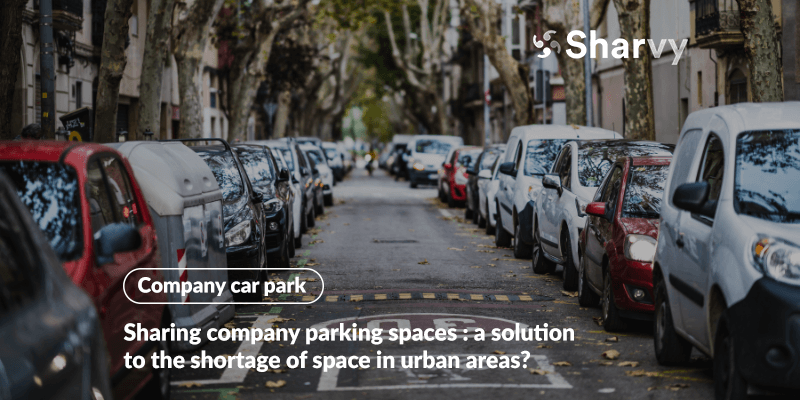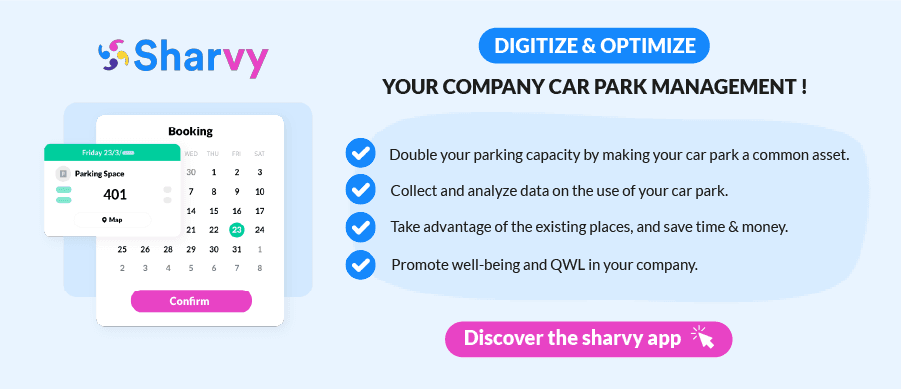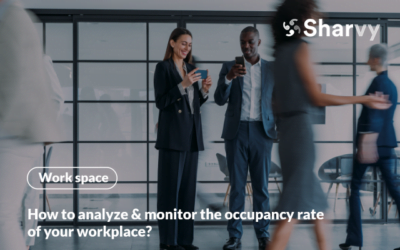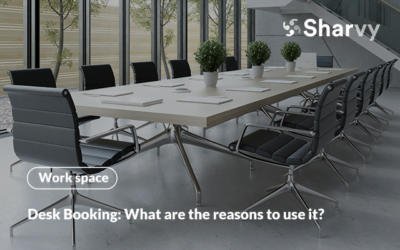Did you know that nearly 30% of urban drivers spend an average of 15 to 30 minutes a week looking for a parking space (San Francisco Examiner headline)? At work, this statistic takes on an even more critical dimension : delays, stress and frustration accumulate, having a direct impact on the productivity and well-being of your employees.
Faced with this reality, companies located in dense urban areas often find themselves out of their depth. Car parks, with their limited capacity, are unable to meet the growing demand. But rather than building more spaces, another solution is emerging: sharing parking spaces within companies.
By optimising the use of available spaces through dedicated solutions, this concept promises to reduce tensions & maximise existing resources. But how does it work in practice, and what are its advantages? Focus.
The shortage of company parking spaces : a major problem?
1. Urban saturation.
In major cities, finding a parking space is (very often) an obstacle course. This situation is particularly difficult for employees travelling to work by car.
Today, more than 68% of Britons employees opt for this mode of transport for their daily commute. And it’s not always out of comfort or habit: for many, it’s because they have no other solution, due to the lack of public transport, or because their working hours are not compatible with trains and buses.
Against this backdrop, companies located in densely populated urban areas are struggling to meet the growing demand. The main obstacle is space, which has become a precious and limited resource. In cities like London and Manchester, developing new car parks is proving to be a considerable challenge. Land is in short supply, and acquiring it requires substantial budgets. What’s more, town planning regulations often impose constraints that limit these projects even further…
In suburban areas, where space seems more accessible, the constraints persist. Companies have to choose between several uses : offices, green spaces, warehouses, etc. In this equation, parking often becomes a secondary priority. These accumulated difficulties accentuate the tensions between employee expectations and the resources that employers can mobilise to meet them.
2. The impact on companies and their employees.
You may already be experiencing this problem, but you don’t always realise the extent of it.
The 1st impact is lost time. Finding a parking space in town can easily take 15 minutes a day. Multiplied over a week, a month, a year… that’s thousands of hours wasted. Your employees could use this time to arrive at the office relaxed, or to concentrate on their projects from the start of the day.
At the same time, there’s stress. And we all know how insidious this factor can be. Imagine starting your day feeling tense, simply because you failed to park on time. These little moments of frustration, repeated day after day, end up taking their toll on your morale. They can lead to mental fatigue, a feeling of injustice and disengagement from work.
For companies, this situation is not neutral. Over and above the hours of lost productivity, parking represents a real financial headache. A simple additional asphalt surface, with road markings to demarcate parking spaces, can cost between £2,000 and £3,000 (excluding the cost of the land, of course).
Added to this are the resource-intensive maintenance and management costs, as well as the rising cost of leasing external parking spaces, which adds to budgets over the long term.
Finally, the company’s image can suffer. Employees frustrated by parking problems will tend to express their dissatisfaction. Similarly, external partners and customers, confronted with similar difficulties, may take a negative view of the company’s ability to organise itself.
In short, the shortage of company parking spaces is not just a logistical constraint, but a challenge with multiple impacts. Sharing parking spaces is a solution that needs to be seriously considered.
The concept of sharing company parking spaces.
1. How does space sharing work in a company car park?
In many companies, the car park remains a symbolic space, where the allocation of spaces sometimes reflects rigid hierarchies. For example, reserving spaces for senior managers & allocating spaces according to seniority is still a widespread practice (unfortunately).
These policies are designed to enhance status and loyalty to the company, but they also cause frustration among non-privileged employees, especially at a time when fairness and inclusion are becoming priorities.
Seat sharing, on the other hand, offers a more collaborative and dynamic approach.
Each employee can reserve a parking space via an application, depending on the availability of spaces.
Then, when an employee (the holder) does not plan to use his or her space – for example, when teleworking, on days off, or on business trips – it is released and made available to other employees.
This rotation optimises the use of the car park, and allows employees who have been allocated parking spaces to keep their privileges.
And to ensure that this sharing of spaces is fair, a company car park management application such as Sharvy should be used.
This is what UpCoop chose to do when they moved to new premises. The challenge? To go from a car park with 600 spaces to 310 spaces for 850 employees, without impacting on quality of life. We’ll go into a bit more detail in the following case study.
Finally, note that some companies are taking this concept even further by prioritising (from within the application) categories of employees with specific needs.
For example, rather than giving priority to managers and senior staff, they allocate places to employees with particular constraints, such as pregnant women and people with reduced mobility.
This approach reflects a desire to make the working environment more inclusive and more humane.
2. The benefits of sharing parking spaces for your company & your employees.
Sharing parking spaces is not just an innovative idea : it generates real, tangible benefits, both for you as a company and for your employees.
For you, as a company :
- Resources optimisation : By maximising the use of existing parking spaces, you avoid having to invest in costly new infrastructure. In urban areas, a parking space can cost between £2,000 and £3,000 to develop.
- Lower costs : Limiting expenditure on building and renting external parking spaces means you can manage your budget better in the long term.
- Improved brand image : By adopting a fair & modern system, you show that your company is innovative, cares about the well-being of its employees and listens to their needs. This becomes a major asset when it comes to attracting new talent in an increasingly competitive market.
- Positive environmental impact : Optimising the use of existing parking spaces & encouraging practices such as car-sharing will enable your company to reduce its ecological footprint.
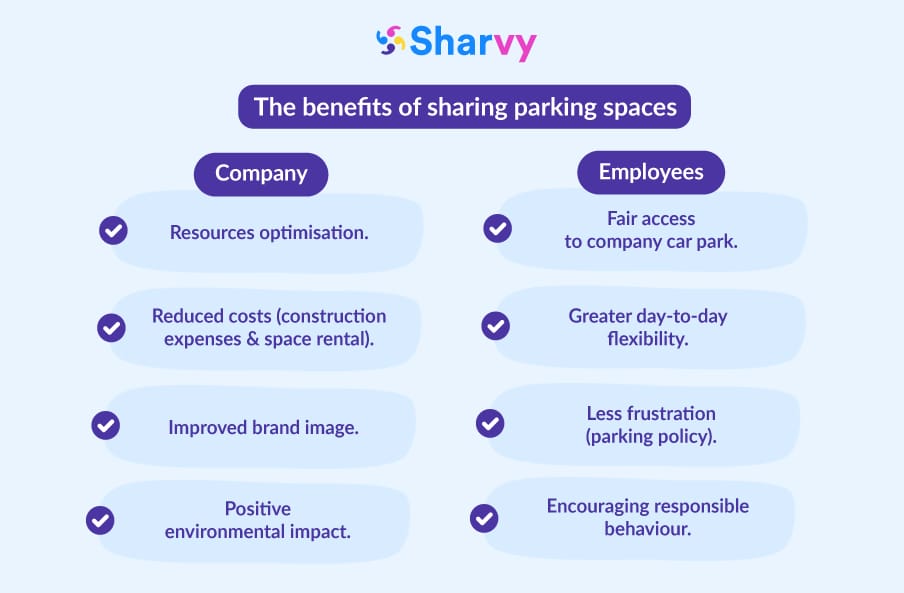
For your employees :
- Fair access to company car park : Sharing spaces ensures that every employee has an equal chance of obtaining a space, regardless of their hierarchical status and seniority.
- Greater flexibility : Thanks to a dedicated application like Sharvy, your employees can reserve a space according to their specific needs, reducing the stress and time wasted looking for a space.
- Less frustration : By better organising access to car parks, you can improve your employees’ Quality of Life & Working Conditions (QWL).
- Encourage responsible behaviour : By reserving spaces for teams who carpool, you encourage your employees to adopt more responsible practices, while strengthening the collective dynamic within your company.
The challenges and limits of sharing parking spaces in the workplace.
1. Organisational constraints.
While the principle is simple – free up seats to make them available to other employees – actually putting it into practice requires meticulous management of availability and fluid communication.
First of all, it is crucial to adopt a dedicated solution such as Sharvy, enabling you to monitor available and reserved spaces in real time. Without the right application, manual seat management would be a logistical headache. You need to ensure that every available space is immediately accessible to those who need it, without causing confusion or inefficiency.
Another challenge is integrating this system into environments where parking is perceived as a privilege, often associated with hierarchy.
Changing this organisation radically, by offering total flexibility, could create tensions. Your employees may be reluctant to share their parking spaces, especially if they feel that their comfort and privileges are being called into question.
On the other hand, adjustments will have to be made to meet specific needs, such as those of people with reduced mobility & teams who require daily access to specific spaces.
Finally, the system must be flexible enough to adapt to fluctuations in your employees’ schedules . For example, during busy periods, such as the beginning and end of the day, you may need to allocate specific time slots to prevent the system from becoming chaotic.
Without a dedicated solution, this can be a real headache. That’s why you need an application like Sharvy, capable of managing these organisational constraints automatically.
2. Cultural and legal resistance.
Although sharing company parking spaces is a modern solution, it often encounters cultural resistance that is deeply rooted in the organisation.
In many companies, parking is seen as a status symbol & a privilege reserved for certain groups (directors, managers, etc.).
These practices are ingrained in the company’s culture, and changing this perception requires well thought-out change management.
Employees who benefit from reserved seats could feel that this new model is a form of loss of status and advantage. Management must therefore be prepared to communicate the benefits of this system, in terms of equality, well-being at work and respect for the environment.
However, thanks to the Sharvy solution, you can choose to give this privilege to certain employees. All you have to do is tell them to vacate their seats on days when they are not on site.
Finally, there may be privacy management concerns. By allowing employees to reserve parking spaces via an application, you collect data on their attendance and departure times.
Make sure that this data is protected & used only for relevant purposes, in compliance with personal data protection regulations (such as the RGPD in Europe).
In conclusion
Sharing company parking spaces is not simply a response to the shortage of spaces, but a real gamble on the future of urban organisation. This solution reinvents corporate space management by promoting flexibility and collaboration, while offering an alternative to rigid and costly structures.
Of course, this model is not without its challenges. Changing habits, complying with regulations and adapting to the specific needs of each individual requires serious thought and adjustments. But when these challenges are met, parking space sharing can become a powerful lever for more responsible & sustainable management of parking spaces.
Have a question? Check the following FAQ !
Is the concept of sharing parking spaces suitable for all companies?
Clearly, the concept of sharing parking spaces is primarily designed to meet the needs of companies that have fewer parking spaces than their employees.
In such structures, where competition for a space is inevitable, this model offers a fairer & more optimal distribution of available spaces, while maximising their use.
However, even companies with a sufficient number of spaces can benefit from this approach, in particular to encourage responsible behaviour such as car-pooling & improve the management of car park access.
It can be adapted to a wide range of business configurations, from small businesses to large organisations with multi-site car parks.
What should be done if employees abuse the system & reserve places without using them?
If abuse does occur, there are a number of possible solutions, which the company can freely integrate into the Parking Management application.
One of the first steps is to set up an access control system to track who has booked a space but not used it (the famous “no shows”).
Thanks to this monitoring, it is possible to identify (via the car park statistics, available from the Sharvy application) the employees concerned & to check the reasons for their absence.
After several incidents of this type, the administrator can choose to impose a penalty on the employee (e.g. ban on access to the car park for 10 days). This ensures that priority is given to employees with better attendance records.
Want to find out more? Check out our latest articles!
How to analyze & monitor the occupancy rate of your workplace?
How do you calculate the occupancy rate of your workplace? What is the difference with the expansion rate of your offices? Focus!
Desk Booking : what are the reasons to use it?
What is desk booking? Who is it for? What are the advantages and disadvantages of this practice? Find the answers here.
Hospitality management : the right business strategy?
What is Hospitality Management? Is it the right business strategy? What are the benefits? Focus in this article.
Subscribe to our newsletter!
Resources
Contact us
+44 117 463 6990

